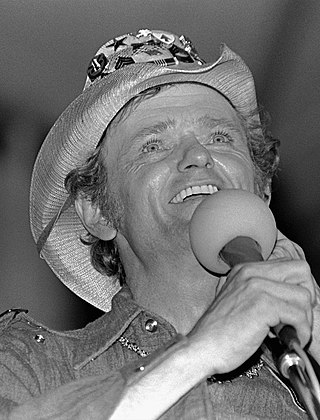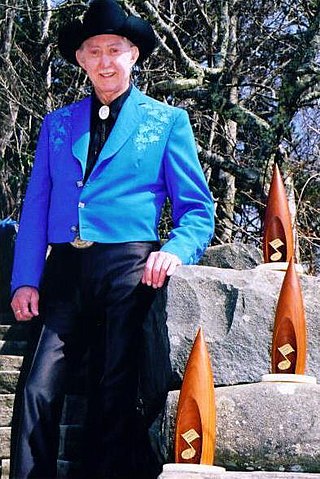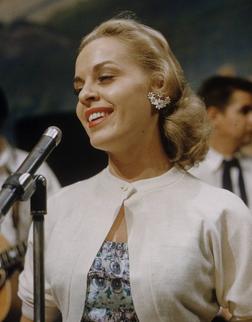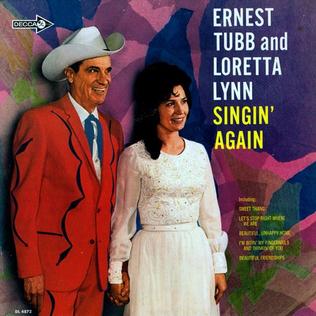
Ernest Dale Tubb, nicknamed the Texas Troubadour, was an American singer and songwriter and one of the pioneers of country music. His biggest career hit song, "Walking the Floor Over You" (1941), marked the rise of the honky tonk style of music.

Jerry Reed Hubbard, known professionally as Jerry Reed, was an American country singer, guitarist, composer, songwriter and actor who appeared in more than a dozen films. His signature songs included "Guitar Man", "U.S. Male", "A Thing Called Love", "Alabama Wild Man", "Amos Moses", "When You're Hot, You're Hot", "Ko-Ko Joe", "Lord, Mr. Ford", "East Bound and Down", "The Bird", and "She Got the Goldmine ".
This is a list of notable events in country music that took place in the year 1974.
This is a list of notable events in country music that took place in 1965.

Jack Henry Greene was an American country musician. Nicknamed the "Jolly Greene Giant" due to his height and deep voice, Greene was a long time member of the Grand Ole Opry. A three-time Grammy Award nominee, Greene is best known for his 1966 hit, "There Goes My Everything". The song dominated the country music charts for nearly two months in 1967 and earned Greene "Male Vocalist of the Year", "Single of the Year", "Album of the Year" and "Song of the Year" honors from the Country Music Association. Greene had a total of five No. 1 country hits and three others that reached the top ten. Billboard magazine named Greene one of the Top 100 "Most Played Artists".
This is a list of notable events in country music that took place in the year 1949.
This is a list of notable events in country music that took place in 1948.
This is a list of notable events in country music that took place in the year 1946.
This is a list of notable events in country music that took place in the year 1943.
This is a list of notable events in country music that took place in the year 1941.

Argolda Voncile "Goldie" Hill was an American country music singer. She was one of the first women in country music, and became one of the first women to reach the top of the country music charts with her No. 1 1953 hit, "I Let the Stars Get In My Eyes". Along with Kitty Wells and Jean Shepard she helped set the standard for later women in country music.
Paul Cohen was an American country music producer.

Richard Anthony Sterban is an American singer. He was born in Camden, New Jersey. In 1972, he joined the country and gospel quartet The Oak Ridge Boys, in which he sings bass.

Singin' Again is the second collaborative studio album by American country music singers Ernest Tubb and Loretta Lynn. It was released on May 29, 1967, by Decca Records.

Country Favorites – Willie Nelson Style is the fourth studio album by country singer Willie Nelson. He recorded it with Ernest Tubb's band, the Texas Troubadours and Western Swing fiddler-vocalist Wade Ray with studio musicians Jimmy Wilkerson and Hargus "Pig" Robbins. At the time of the recording, Nelson was a regular on a syndicated TV show hosted by Tubb.

Ernest Tubb and His Texas Troubadours is an album by American country singer Ernest Tubb, released in 1960.
"The Lord Knows I'm Drinking" is a song written by Bill Anderson, and recorded by American country music singer Cal Smith. It was released in November 1972 as the third single from the album I've Found Someone of My Own.

"Country Bumpkin" is a song written by Don Wayne, and recorded by American country music artist Cal Smith. It was released in February 1974 as the first single and title track from the album Country Bumpkin. The song was Smith's second number one on the country chart. The single stayed at number one for a single week and spent a total of ten weeks on the country chart.
Donald William Choate, who wrote and recorded as Don Wayne, was an American country music songwriter.
Leon Rhodes was an American country music musician. A guitarist, he primarily played behind Ernest Tubb as part of the Texas Troubadours and later was a house band member for the television programs Grand Ole Opry and Hee Haw. Rhodes also played as a session musician for various country singers such as Willie Nelson, Waylon Jennings, Loretta Lynn, George Strait, and John Denver, among others.









